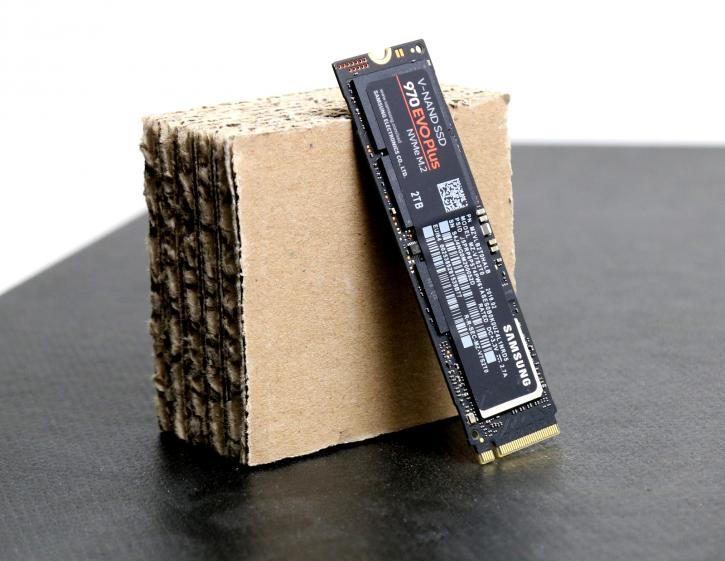Final Words & Conclusion
Final Words & Conclusion
Bigger, better, stronger, faster ... you've heard that before. Well, it covers all the registers that the EVO Plus 2TB has to offer. Samsung maxes out NVMe 1.3 protocol and 3x PCIe bandwidth as well as offering all that on a 2 Terabyte volume size. The rest of the conclusion, however, is similar towards the previous models we have tested. So yes, the performance that the Plus model is really good. Whether or not you'd ever notice ~2 GB/s reads over ~3 GB/s writes (coming from the regular 970 EVO) I do think is a debatable luxury discussion. This 2TB SSD offers what is advertised, writes are very fast. Remember, to fully utilize the performance that is offered for this NVMe SSD you need a supporting infrastructure and this a motherboard with PCI Express Gen3 (x4) interface and NVMe ready BIOS. NVMe based storage is one the most exciting technologies that we have been following developments closely over the past few years was obviously the development curve of NAND flash-based storage technology. We moved from a "blisteringly fast" 150 MB/sec HDD towards numbers that are 20 to 30 fold of that in the 3.5GB/sec ranges with access times exponentially faster, which I like to call eye-soaring. Would you ever notice a difference between a 2.5GB/s write or one at 3.5 GB/sec though? We honestly doubt that that's seeking within an extremely narrow margin (split second IO). It really depends on your complex workloads. As a gamer, no not likely, but if you write out a lot of video encoding content for example, here's where it could matter. For us, regular Joe's even a proper quality SATA3 SSD will offer you 98% of the performance you need and notice, so if you'd ever notice that last 2 % of extra access-times and writes is debatable. The new 64 and 96 node layer NAND helps in cutting down costs, the Phoenix controller gives that little extra edge in perf and the nickel plating on top of the controller helps it bypass thermal throttling better. The EVO Plus model is offered at proper endurance numbers, depending on the model (volume size) 300 TB written for a 512GB model, 600 TBW for a 1TB model and 1200 TBW for a 2TB unit, and that combined with a 5-year warranty will offer a lot of reassurance and ease of mind. If the controller or the NAND doesn't die, it would last you a decade or even two (depending on your workload and write outs).
Performance
Samsung plays with the MLC moniker for naming which I wish they wouldn't, this NAND is written 3 bits per cell, that's TLC and thus that discussion ends here. Three bits is multiple bits as in Multi as in MLC. Really this is TLC, period. Technologies like TLC and QLC face some challenges writing more bits per cell of NAND, we noticed a dropoff in performance with mixed heavy workloads that exceed writing dozens of gigabytes continuously. After you pass that 80~85 GB of writes (and I do mean continuous sustained/linear writes minute after minute), then the SLC buffer is full and start to write directly to TLC, and then perf drops. After a few minutes or even seconds the SLC cache will have written out and boom, performance is back full speed. This, in a nutshell, is what you need to be aware of with TLC and QLC SSDs. However, the Plus still managed 1.5 GB/sec here in a worst-case scenario which is still ridiculously fast as 'worst performance' metric.
Pricing
At the time of writing, the driver has just started listing, so a rough exchange rate brings the 2TB model to 499 EUR and roughly 599 USD which brings the price per GB towards 25 to 30 cents depending on your currency and local VAT:
|
970 EVO PLUS V-NAND M.2 |
|
|
|
|
PCIe Gen3. X4, NVMe 1.3 Phoenix Controller |
250GB |
MZ-V7S250BW |
SR: up to 3500MB's SW: 2300 MB/s RR QD32 : MAX250K IOPS RW QD32: 550K IOPS |
|
500GB |
MZ-V7S500BW |
SR: up to 3500MB's SW: 3200 MB/s * RR QD32 : MAX480K IOPS RW QD32: 550K IOPS |
|
|
1TB |
MZ-V7S1T0BW |
SR: up to 3500MB's SW: 3300 MB/s RR QD32 : MAX600K IOPS RW QD32: 550K IOPS |
|
|
2TB |
MZ-V7S2T0BW |
SR: up to 3500MB's SW: 3300 MB/s RR QD32 : MAX620K IOPS RW QD32: 560K IOPS |
|
This SSD writes and reads serious amounts of tiny files in a very fast fashion. We stated it before though, IOPS is not something you as a consumer should worry about too much unless you are doing a lot of database related work or create similar workloads on your PC, but this SSD certainly ranks high within this aspect. The trace tests also show exceptional performance levels, enthusiast class NVMe. Overall the series is impressive. Zoom in at both IOPS and trace performance and you'll notice that the SSD can manage serious workloads without breaking so much as a drop of sweat. So whether you write lots of small files simultaneously, copy big MKV movies or do it all together. We do need to make a remark on measured controller temperature, it runs hot under load and that can cause throttling. So please do cool down the product with a proper M2 heatsink, most motherboards supply one default these days. This is the nature of enthusiast-class M2 SSDs these days.
Concluding
All good things come at a price, and at 25 Cents per GB this is not the cheapest TLC NAND series your money can get you, but it is among the fastest. Remember, the EVO PLUS series mostly offers improved write performance. We're taking an extra 500 MB/sec on writes. That metric won't bring anything noticeable for your game PC other than bragging rights. It, however, does make Samsung the fastest on the globe, as they squeeze out every little bit of performance the what the PCIe x4 Gen 3 lanes can take. The throughput is insane, the writes are insane. Samsung will offer you a 5-year warranty on the 970 Plus product series (that or the TBW value whichever one comes first), and that in technology land is a proper warranty to have. I'll keep saying this, even with the slowest SATA3 SSD, you can find, the access times will make a tremendous difference as you do not have a mechanical magnetic head seeking data on platters. The step from SATA3 HDD to a SATA3 SSD is HUGE, the step from a SATA3 SSD towards this NVMe SSD is once again huge, but less noticeable .. and that is the honest truth. The 970 EVO Plus 2 TB unit is rated at 1200 TBW. So if you write 50 GB per day x 365 days, that's 18,25 TB per year. 1200:18,25 = 66 Years. The conclusion for the 970 EVO Plus model stands, this is a top pick award-winning product, however with one remark; you need that complex writing to justify the Plus version. It simply is that good, but expect something in that 25 to 30 cents per GB in a year where we're going to hit <10 Cents per GB.
Recommended Downloads



